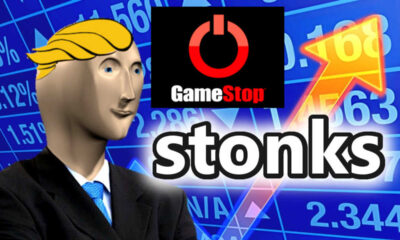Business
This Severely Undervalued OTC Sensation (RDE, Inc. | RSTN) Is On Track for a 2024 NASDAQ Uplisting
When it comes to severely undervalued companies, RDE, Inc. (OTC: RSTN) serves as a prime example, recently estimated to be worth $250 million against a current market cap of just shy of $40 million. The company has now applied for uplisting to the Nasdaq Capital Markets and, if Nasdaq approves its application, a drastic correction to its undervalued status will likely take place.

OTC markets can be a little hit-and-miss. In fact, it’s usually more miss than hit.
The downside, of course, is that finding probable winners can be a gargantuan task.
But the upside is that if you do find a winner, chances are you’ll win big.
Really big.
Especially if your chosen winner then graduates to, let’s say, a Nasdaq exchange.
And, as it turns out, we’ve identified one company that might just pull this feat off in 2024 — RDE, Inc. [OTC: RSTN], which has just submitted its application for an uplisting to Nasdaq Capital Markets.
RDE, Inc. Is Severely Undervalued — Here’s Why Nasdaq’s Approval Will Give Investors Whiplash
A bit later, we’re going to get around to telling you more about RDE, Inc. [OTC: RSTN] and why it was such a sensation in 2023. But, for now, the only thing you need to know is that we believe it is currently severely undervalued.
And I don’t just mean “you can grab 50% off this stock during post-Christmas clearance sales” sort of undervalued.
I mean the sort of undervaluation where a company worth an estimated $250 million finds itself trading with a market cap of just $40 million.
That’s the exact position RDE is in right now — a $250 million company with a $40 million market cap.
Now, at first, this might seem like some sort of glitch in the matrix. How is a 6-7x undervaluation even possible?
But, if you think about it just a little, it actually makes perfect sense.
Or, at least, it makes perfect sense if you’ve ever heard a phrase resembling “investor expectations are built into stock prices.” Quite frankly, the average investor usually doesn’t expect the moon from an OTC stock, and so they price it accordingly.
And it makes even more sense when you take into account a bunch of other factors that can lead to a company being severely undervalued. Here are just a few:
- Liquidity: OTC stocks generally have lower liquidity — investors expect a discount for harder-to-liquidate positions that are usually also accompanied by larger bid-ask spreads.
- Perception and Visibility: Stick a stock on, let’s say, a Nasdaq exchange, and it automatically gets two things for free — much greater visibility (way more people/traders/investors/analysts/etc. are watching/trading on Nasdaq exchanges), and a boost in perceived legitimacy courtesy of the Nasdaq halo effect.
- Limited access to capital: The same issues that can lead to companies being undervalued also limit their access to capital markets — this can limit growth prospects, which can lead to further undervaluation, especially for capital-intensive growth-stage companies.
- Limited exposure to institutional investors: Many funds and institutional investors avoid dealing in OTC stocks due to risk profile, liquidity, etc. — this severely limits the pool of potential investors.
In short, a bunch of compounding factors often result in even the best OTC-listed companies remaining severely undervalued.
And that’s why, if Nasdaq approves RDE’s uplisting application, anyone watching RDE’s stock [OTC: RSTN] could be in for a severe case of whiplash in 2024.
That 6-7x undervaluation will disappear in the blink of an eye.
(In fact, there’s usually a pretty good chance a stock will cross over into overvaluation in the early days of listing on a major exchange as a flood of new investors flock to the latest shiny thing — if you’re going to buy, don’t do it when the hype’s at its peak.)
So What Does RDE, Inc. Do?
RDE, Inc. [OTC: RSTN] is the holding company behind the online platforms Restaurant.com and CardCash.com. Both of these platforms operate as online marketplaces in a fast-growing corner of the dining, shopping, and entertainment landscape.
In the case of Restaurant.com, it runs an online dining deals platform. Here, restaurants list heavily discounted “meal certificates” (like a restaurant-specific gift card) as a way to get exposure to new customers/fill empty tables/etc. Diners can then purchase these meal certificates and enjoy discounted dining experiences. (For a better understanding, see this article about the Restaurant.com dining app.)
As for CardCash.com, that works a lot like Restaurant.com, but with two major differences. First, CardCash.com is an online platform for buying and selling basically any gift card under the sun, from Amazon to Texas Roadhouse. And second, the discounted inventory comes from businesses and consumers selling unwanted gift cards. (For a better understanding, see this article about CardCash.com and its play for a chunk of the $325 billion/year gift card market.)
Now, if you’ve been paying attention, these two RDE businesses — CardCash.com and Restaurant.com — are highly synergistic. And while we don’t have the space to give you the full analysis here, for those who missed it, let’s just make one thing clear. Both businesses are online marketplaces offering a vast inventory of dining, retail, and entertainment vouchers at sharp discounts.
Of course, this is a gross simplification, and there is a lot more to the CardCash.com x Restaurant.com synergy story here. So maybe take a few minutes to read this article covering the initial RDE announcement of its CardCash.com acquisition.
And Why’s it On Track for Nasdaq Approval?
As would be expected, the requirements for listing on a Nasdaq exchange are a little more stringent than those for an OTC listing. And while a lot of them are reporting/corporate governance-type criteria that any company could, theoretically, check off if they wanted to, there are a few hard listing requirements.
As for what these hard requirements are, they mostly come down to crossing a few thresholds, like market value, years of operating history, stockholder’s equity, etc.
And as for whether RDE has crossed these thresholds, the answer is yes on all fronts.
That means, more or less, the only thing that could get in the way of Nasdaq approving RDE’s application will be if it takes issue with something in RDE’s corporate governance standards. And, it’s probably a pretty safe bet that was more or less in order before RDE even submitted its application to Nasdaq — there is a non-refundable application fee, after all.
Follow This Story Now
Naturally, there are a couple of things we can’t guarantee here.
First, we can’t guarantee that RDE, Inc. will gain Nasdaq approval.
And second, we can’t guarantee that markets will eventually correct RDE’s currently undervalued price.
Although, we give both a very high probability of happening.
But there are a couple of things we can guarantee with 100% certainty.
First, this is a story you absolutely must follow now (and we’ll be sure to provide ongoing updates).
And second, if you do follow this story and don’t act before any Nasdaq uplisting occurs, there’s a good chance you’ll live to regret the one that got away.
__
(Featured image by Yiorgos Ntrahas via Unsplash)
DISCLAIMER: This article was written by a third party contributor and does not reflect the opinion of Born2Invest, its management, staff or its associates. Please review our disclaimer for more information.
This article may include forward-looking statements. These forward-looking statements generally are identified by the words “believe,” “project,” “estimate,” “become,” “plan,” “will,” and similar expressions. These forward-looking statements involve known and unknown risks as well as uncertainties, including those discussed in the following cautionary statements and elsewhere in this article and on this site. Although the Company may believe that its expectations are based on reasonable assumptions, the actual results that the Company may achieve may differ materially from any forward-looking statements, which reflect the opinions of the management of the Company only as of the date hereof. Additionally, please make sure to read these important disclosures.

-

 Africa1 week ago
Africa1 week agoBLS Secures 500 Million Dirhams to Drive Morocco’s Next-Gen Logistics Expansion
-

 Fintech2 weeks ago
Fintech2 weeks agoRipple Targets Banking License to Boost RLUSD Stablecoin Amid U.S. Regulatory Shift
-

 Impact Investing3 days ago
Impact Investing3 days agoSustainable Investments Surge in Q2 2025 Amid Green and Tech Rebound
-

 Biotech1 week ago
Biotech1 week agoBiotech Booster: €196.4M Fund to Accelerate Dutch Innovation








![RDE, Inc. [NASDAQ: RSTN] hits the Nasdaq](https://born2invest.com/wp-content/uploads/2024/08/rde-inc-hits-the-nasdaq-400x240.jpg)
![RDE, Inc. [NASDAQ: RSTN] hits the Nasdaq](https://born2invest.com/wp-content/uploads/2024/08/rde-inc-hits-the-nasdaq-80x80.jpg)















